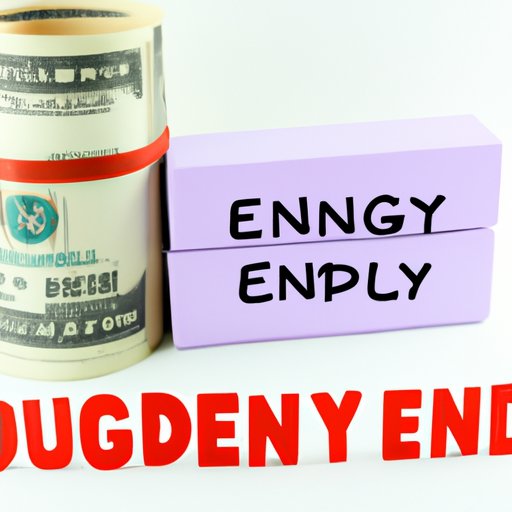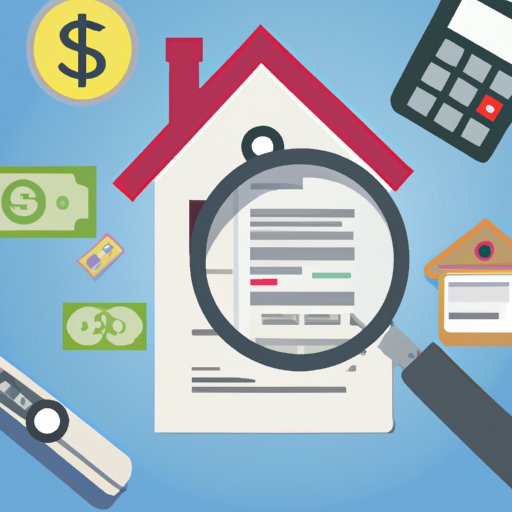Introduction: Overview of the Problem and Purpose of the Article
Buying a house is one of the biggest financial decisions you’ll make in your life. It can also be a daunting process, especially when it comes to getting your finances in order. In order to purchase a home, you’ll need to make sure your spending is in check, save up an emergency fund, pay off debt, research mortgage options, save for a down payment, consider alternative financing options, and check your credit score. This article will provide a comprehensive guide on how to get your finances in order to buy a house.
Start Tracking Your Spending and Create a Budget
The first step in getting your finances in order is to start tracking your spending and create a budget. A budget is a plan that outlines how much money you have coming in and how much money you’re spending each month. By creating a budget, you’ll be able to see where your money is going and adjust accordingly. A budget will also help you set financial goals and stay on track with your spending.
Benefits of Budgeting
Budgeting is a great way to take control of your finances and reach your financial goals. It can help you save more money, reduce your spending, and stay on top of your bills. It can also help you identify areas where you can cut back and put those savings towards other important goals like saving for a down payment or paying off debt.
How to Create a Budget
Creating a budget can seem overwhelming at first, but it doesn’t have to be. The most important thing to remember is to be realistic about your spending. Start by listing all of your income sources. Then list all of your expenses, including fixed expenses (rent/mortgage, utilities, etc.), variable expenses (shopping, dining out, etc.), and discretionary expenses (entertainment, vacations, etc.). Once you have your expenses listed, add up the total and compare it to your total income. If your expenses are higher than your income, you’ll need to find ways to cut back.
Setting Financial Goals
Once you have a budget in place, it’s important to set financial goals. These goals should be specific, measurable, and achievable. For example, if you want to save for a down payment, set a goal of how much you want to save and a timeline for reaching that goal. Setting financial goals will help keep you motivated and on track with your spending.

Build or Increase Your Emergency Fund
Having an emergency fund is essential when it comes to getting your finances in order. An emergency fund is a stash of money saved up for unexpected expenses or emergencies. Having an emergency fund will give you peace of mind knowing that you’re prepared for whatever comes your way.
Benefits of an Emergency Fund
Having an emergency fund is beneficial for several reasons. It can help you avoid taking on debt if an unexpected expense arises. It can also help you stay on track with your financial goals and prevent you from having to dip into your savings or retirement accounts. Finally, it can help you feel more secure and confident in your financial future.
How to Increase Your Emergency Fund
If you don’t have an emergency fund, now is the time to start building one. Start by setting a goal of how much you want to save. Then look for ways to cut back on your spending and put that extra money towards your emergency fund. You can also consider increasing your income by taking on a side hustle or finding another job. Finally, consider automating your savings so that a certain amount of money is transferred from your checking account to your savings account each month.
Tips for Saving More Money
Saving money can be difficult, but there are several tips that can help. First, make sure you’re taking advantage of discounts and coupons. Second, shop around for the best deals on products and services. Third, take advantage of cashback programs. And finally, look for ways to reduce your monthly expenses, such as switching to a cheaper cell phone plan or negotiating lower rates with your cable provider.

Pay Down Debt and Keep Credit Utilization Low
Paying down debt is another important step in getting your finances in order. Having too much debt can prevent you from qualifying for a mortgage and can also affect your credit score. To get your finances in order, it’s important to pay down any existing debt and keep your credit utilization low.
Benefits of Paying Down Debt
Paying down debt has several benefits. First, it can help you qualify for a mortgage and other types of loans. Second, it can improve your credit score. Third, it can free up more money each month to put towards other financial goals. Finally, it can help you achieve financial freedom and peace of mind.
Strategies for Paying Off Debt
There are several strategies for paying off debt. One popular strategy is the “debt snowball” method, which involves paying off your smallest debts first and then moving on to larger debts. Another strategy is the “debt avalanche” method, which involves paying off your highest-interest debts first. Whichever strategy you choose, make sure you’re making regular payments and avoiding any new debt.
Benefits of Keeping Credit Utilization Low
Keeping your credit utilization low is important for several reasons. First, it can help improve your credit score. Second, it can make you a more attractive borrower to lenders. And third, it can help you qualify for better interest rates on loans and credit cards. To keep your credit utilization low, make sure you’re only using up to 30% of your available credit limit.

Research and Compare Mortgage Options
Once you have your finances in order, it’s time to start researching and comparing mortgage options. There are many different types of mortgages available, so it’s important to do your research and find the best option for you.
Benefits of Researching Mortgage Options
Researching mortgage options can help you find the best deal on a home loan. It can also help you understand the different types of mortgages available and their respective terms and conditions. Doing your research can also help you identify potential red flags and avoid costly mistakes.
Different Types of Mortgages
When it comes to mortgages, there are several different types to choose from. Fixed-rate mortgages offer a consistent interest rate over the life of the loan. Adjustable-rate mortgages offer an initial fixed rate followed by adjustable rates. There are also FHA loans, VA loans, and USDA loans, which are government-backed loans designed to help people with limited incomes purchase a home. Finally, there are jumbo loans, which are for borrowers looking to purchase a home that costs more than the conforming loan limit.
How to Compare Mortgage Options
Once you’ve identified the type of mortgage you’re looking for, it’s time to compare different lenders. Look for lenders that offer competitive interest rates, fees, and closing costs. Also, make sure the lender is reputable and has good customer service. Finally, read reviews from past customers to get a better idea of what to expect from the lender.
Save for a Down Payment
Saving for a down payment is an important step in getting your finances in order. A down payment is the amount of money you’ll need to pay upfront when purchasing a home. Most lenders require a minimum down payment of 3-5%, though this amount can vary depending on the type of loan you’re applying for.
Benefits of Saving for a Down Payment
Saving for a down payment can help you get the best deal on a home loan. It can also help you avoid private mortgage insurance, which is an added cost associated with low down payments. Finally, having a larger down payment can help you qualify for a better interest rate.
How to Save for a Down Payment
Saving for a down payment can be challenging, but it’s possible with the right approach. Start by setting a goal of how much you want to save and a timeline for reaching that goal. Then look for ways to cut back on your spending and put that extra money towards your down payment. Consider taking on a side hustle or finding another job to increase your income. Finally, automate your savings so that a certain amount of money is transferred from your checking account to your savings account each month.
Tips for Saving Money Efficiently
When it comes to saving money, there are several tips that can help. First, use cash instead of credit cards to make purchases. Second, make sure you’re taking advantage of discounts and coupons. Third, shop around for the best deals on products and services. And finally, look for ways to reduce your monthly expenses, such as switching to a cheaper cell phone plan or negotiating lower rates with your cable provider.
Consider Alternative Financing Options
If you don’t have enough money saved for a down payment, you may want to consider alternative financing options. There are several different types of financing options available, so it’s important to do your research and find the best option for you.
Benefits of Alternative Financing Options
Alternative financing options can help you purchase a home even if you don’t have enough money saved for a down payment. They can also help you avoid private mortgage insurance, which is an added cost associated with low down payments. Finally, they can help you qualify for a better interest rate.
Different Types of Financing Options
When it comes to financing options, there are several different types to choose from. Some common options include seller financing, rent-to-own agreements, and bridge loans. Each option has its own pros and cons, so it’s important to do your research and find the best option for you.
How to Choose the Best Financing Option
When choosing a financing option, it’s important to consider the terms and conditions. Make sure you understand the interest rate, repayment period, and any other fees associated with the loan. Also, make sure the lender is reputable and has good customer service. Finally, read reviews from past customers to get a better idea of what to expect from the lender.
Check Your Credit Score
Finally, it’s important to check your credit score before applying for a mortgage. Your credit score is a three-digit number that indicates your creditworthiness. Having a good credit score can help you qualify for better interest rates and loan terms.
Benefits of Checking Your Credit Score
Checking your credit score is beneficial for several reasons. First, it can help you understand where you stand financially. Second, it can help you identify potential red flags that could affect your ability to qualify for a loan. And third, it can help you identify areas where you can improve your credit score.
How to Check Your Credit Score
You can check your credit score for free through several online services, such as Credit Karma and Experian. When checking your score, make sure to review the report for any errors or discrepancies. If you find any errors, contact the credit bureau and ask them to investigate.
Tips for Improving Your Credit Score
If your credit score isn’t where you want it to be, there are several steps you can take to improve it. Start by paying down any existing debt and keeping your credit utilization low. Next, make sure you’re making all of your payments on time and staying within your credit limits. Finally, consider disputing any errors or inaccuracies on your credit report.

Conclusion: Summary of Key Points
Getting your finances in order to buy a house can be a daunting task, but it’s possible with the right approach. Start by tracking your spending and creating a budget. Then build or increase your emergency fund and pay down debt. Research and compare mortgage options, save for a down payment, and consider alternative financing options. Finally, check your credit score and look for ways to improve it. By following these steps, you’ll be well on your way to getting your finances in order and buying the house of your dreams.
(Note: Is this article not meeting your expectations? Do you have knowledge or insights to share? Unlock new opportunities and expand your reach by joining our authors team. Click Registration to join us and share your expertise with our readers.)
